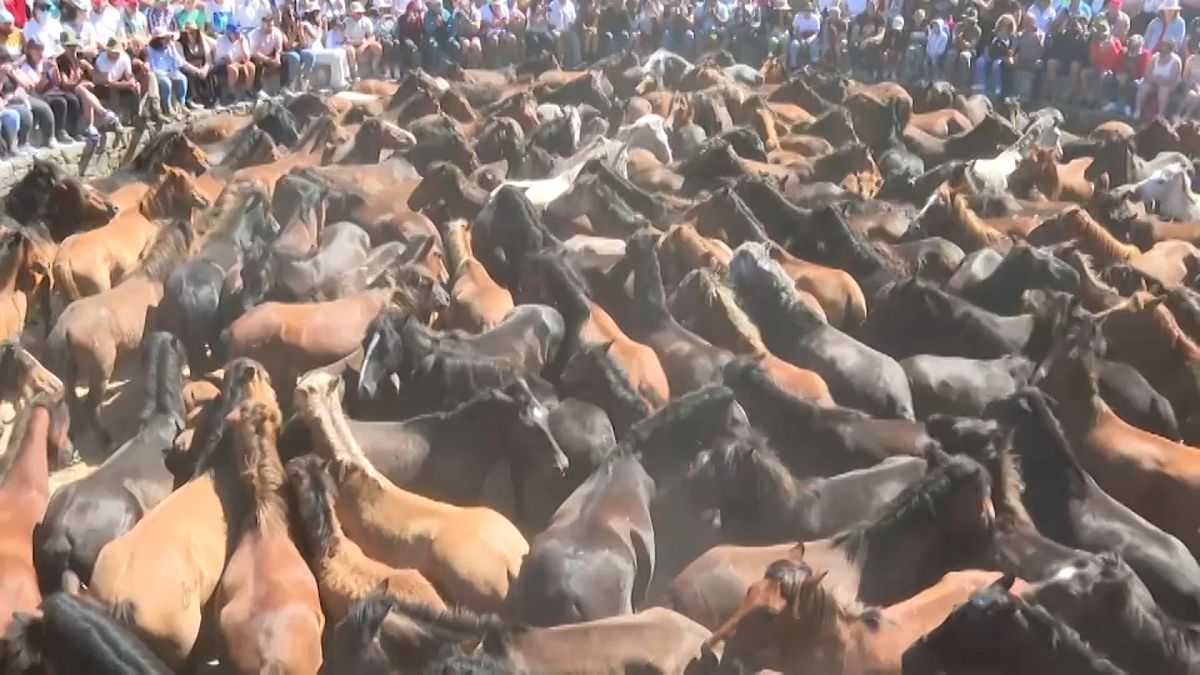The “Rapa das bestas” festival in Sabucedo, a Spanish horse festival that dates back to the 15th century, is becoming increasingly popular each year, according to its organizers. Held annually in the first week of July, the festival is described as a noble confrontation between man and horse. During the celebration, young people from Sabucedo and the surrounding area venture into the mountains at dawn in search of wild horses that roam the area. Once the wild horses are found, they are brought back to the village where their manes are cut. As night falls, attendees gather to enjoy food, music, and wine.
The roots of the “Rapa das bestas” festival in Sabucedo can be traced back to the 15th century, making it a longstanding tradition in the region. Organizers of the festival have noted that its popularity has been on the rise in recent years, attracting more and more visitors each year. The festival is a unique cultural event that showcases the relationship between man and horse, with a focus on the ancestral tradition of taming wild horses. Participants of the festival, mainly young people from Sabucedo and the surrounding area, embark on a journey into the mountains at dawn to locate wild horses, which are then brought back to the village to have their manes cut.
The “Rapa das bestas” festival is characterized by its noble confrontation between man and horse, emphasizing the skill and bravery of those involved in taming the wild animals. The process of cutting the manes of the wild horses is considered a significant aspect of the festival, symbolizing the taming and domestication of the animals. As night descends, attendees of the festival come together to celebrate with food, music, and wine, creating a festive atmosphere that further showcases the cultural significance of the event. The unique blend of tradition, history, and entertainment has contributed to the growing popularity of the festival in Sabucedo.
The cultural significance of the “Rapa das bestas” festival in Sabucedo lies in its preservation of a centuries-old tradition that highlights the bond between man and horse. The festival serves as a tribute to the ancestral roots of the region, showcasing the age-old practice of taming and domesticating wild horses. By participating in the festival, attendees are given the opportunity to witness this unique cultural event firsthand and gain a deeper understanding of the historical significance of the tradition. The festival also serves as a platform for local communities to come together and celebrate their heritage through music, dance, and culinary delights.
The “Rapa das bestas” festival in Sabucedo offers a glimpse into the rich cultural heritage of the region, providing attendees with a unique experience that combines tradition, history, and entertainment. The festival’s emphasis on the interaction between man and horse highlights the longstanding relationship between humans and animals, showcasing the skill and bravery required to tame wild horses. As the festival continues to gain popularity, it has become an important event that attracts visitors from near and far, contributing to the cultural and economic growth of the region. With its ancient roots and modern appeal, the “Rapa das bestas” festival stands as a testament to the enduring significance of traditional practices in contemporary society.
In conclusion, the “Rapa das bestas” festival in Sabucedo is a celebration of the ancient tradition of taming wild horses, dating back to the 15th century. Organized annually in the first week of July, the festival has seen a surge in popularity in recent years, drawing in both locals and visitors alike. The festival highlights the noble confrontation between man and horse, symbolized by the cutting of the wild horses’ manes. Through a combination of tradition, history, and entertainment, the festival offers attendees a unique insight into the cultural heritage of the region, fostering a sense of community and celebration among participants. As the festival continues to grow in prominence, it serves as a reminder of the enduring significance of ancestral practices in preserving cultural identity.











